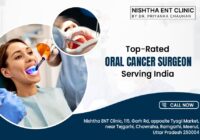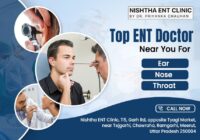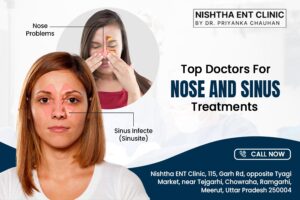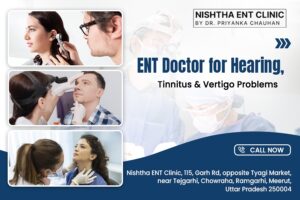Specializing in the diagnosis and treatment of ENT DOCTOR FOR ALLERGY AND SINUS, and related ENT conditions.
When dealing with persistent allergy and sinus issues, consulting a specialist is crucial. An ENT specialist, or ear, nose, and throat doctor, is trained to diagnose and treat conditions related to these areas. They provide expert care for sinus infections and allergic reactio
Finding the right sinus specialist or allergy treatment specialist can significantly improve your quality of life. These professionals offer personalized treatment plans tailored to your specific needs, ensuring effective management of your condition.
Key Takeaways
- ENT specialists are crucial for diagnosing and treating allergy and sinus conditions.
- Consulting a specialist can lead to more effective treatment plans.
- Top-rated ENT doctors offer expert care for sinus and allergy issues.
- Personalized treatment plans can significantly improve your condition.
- Effective management of sinus and allergy conditions improves quality of life.
Understanding the Role of ENT Doctors in Allergy and Sinus Treatment
Otolaryngologists, or ENT doctors, are the medical experts who diagnose and treat disorders related to the ear, nose, and throat, including allergies and sinusitis. Their specialized training enables them to address complex issues that affect these areas, providing relief to patients suffering from various allergy and sinus conditions.
What is an Otolaryngologist?
An otolaryngologist is a medical doctor who has undergone extensive training in the diagnosis, treatment, and surgery of disorders related to the ear, nose, and throat. ENT specialists are equipped to handle a wide range of conditions, from allergic rhinitis to chronic sinusitis. Their expertise extends to both medical and surgical treatments, making them the go-to professionals for patients with complex sinus and allergy issues.
The term “otolaryngologist” comes from the Greek words “otos” (ear), “rhinos” (nose), and “larynx” (voice box), reflecting the scope of their practice. By focusing on the ear, nose, and throat, ENT doctors can address the interconnected issues that often arise in these areas, providing comprehensive care to their patients.
Specialized Training and Qualifications
To become an ENT specialist, one must undergo rigorous medical training. After completing medical school, aspiring otolaryngologists must finish a residency program in otolaryngology, which can last several years. This training equips them with the knowledge and skills necessary to diagnose and treat a wide range of ENT conditions, including those related to allergies and sinusitis.
ENT doctors are also qualified to perform surgeries, such as sinus surgery or septoplasty, when necessary. Their ability to offer both medical and surgical interventions makes them uniquely qualified to treat complex allergy and sinus conditions. By staying up-to-date with the latest advancements in their field, ENT specialists can provide the most effective treatments available.
Common Allergy and Sinus Conditions Treated by ENT Specialists
The expertise of ENT specialists is vital in managing common allergy and sinus conditions that affect a significant portion of the population. These conditions can severely impact an individual’s quality of life, causing discomfort and pain.
Allergic Rhinitis and Seasonal Allergies
Allergic rhinitis, commonly known as hay fever, occurs when the immune system reacts to allergens like pollen, dust, or pet dander. Symptoms include sneezing, nasal congestion, and itchy eyes. ENT specialists can provide effective treatments, including allergy testing and immunotherapy, to manage seasonal allergies.
Chronic Sinusitis and Recurrent Sinus Infections
Chronic sinusitis is characterized by persistent inflammation of the sinuses, leading to symptoms like nasal discharge, facial pain, and loss of smell. Recurrent sinus infections can also be a significant issue, requiring comprehensive treatment plans that may include antibiotics, sinus irrigation, and in some cases, surgery.
Nasal Polyps and Structural Issues
Nasal polyps are benign growths in the nasal passage that can cause breathing difficulties and loss of smell. ENT specialists can diagnose and treat nasal polyps using medications or surgical procedures. Structural issues, such as a deviated septum, can also contribute to sinus problems and may require surgical correction.
By understanding these common conditions and their treatments, individuals can seek the appropriate care from an ENT specialist, improving their quality of life.
When to Consult an ENT Doctor for Allergy and Sinus Problems
When allergy and sinus symptoms persist or worsen, consulting an ENT doctor for allergy and sinus issues can provide relief and effective treatment. Allergy and sinus problems are common, affecting millions of people worldwide. While primary care physicians can manage mild cases, more severe or persistent conditions require the expertise of a sinus specialist.
Warning Signs and Symptoms
Certain symptoms indicate the need for specialized care from an ENT specialist. These include:
- Persistent nasal congestion or discharge
- Recurring sinus infections
- Loss of smell or taste
- Facial pain or pressure
- Chronic cough or sore throat
As noted by the American Academy of Otolaryngology, “If you experience any of these symptoms, it’s essential to consult an ENT doctor to determine the underlying cause and receive appropriate treatment.”
Referral Process from Primary Care
In many cases, a referral from a primary care physician is necessary to see an ENT doctor for allergy and sinus problems. Primary care doctors can assess initial symptoms and decide if specialized care is needed. They may perform preliminary treatments or tests before referring patients to an ENT specialist.
It’s crucial to follow the referral process to ensure that you receive comprehensive care. As emphasized by a leading sinus specialist, “Collaboration between primary care physicians and ENT specialists is key to providing patients with the best possible outcomes.”
Diagnostic Procedures Used by ENT Doctors for Allergy and Sinus Issues
ENT doctors utilize various diagnostic procedures to determine the underlying cause of allergy and sinus issues. These diagnostic tools enable allergy treatment specialists to develop effective treatment plans tailored to each patient’s needs.
Allergy Testing Methods
Allergy testing is a crucial step in diagnosing allergic rhinitis and other allergy-related conditions. There are several methods used by sinusitis doctors to test for allergies.
Skin Prick Tests
Skin prick tests involve applying small amounts of potential allergens to the skin and observing the reaction. This test is quick, relatively painless, and provides immediate results.
Blood Tests for Allergies
Blood tests measure the levels of allergy-related antibodies in the blood. These tests are particularly useful for patients who cannot undergo skin prick testing due to certain medical conditions or medications.
Sinus Imaging and Endoscopy
For patients with suspected sinusitis or other sinus-related issues, sinusitis doctors may recommend sinus imaging and endoscopy. Sinus imaging, such as CT scans, provides detailed images of the sinuses, helping to identify structural issues or abnormalities.
Endoscopy involves inserting a flexible tube with a camera into the nasal passages to visually inspect the sinuses. This procedure can help diagnose conditions such as nasal polyps or chronic sinusitis.
Other Diagnostic Tools
In addition to allergy testing and sinus imaging, ENT specialists may use other diagnostic tools, including spirometry to assess lung function and acoustic rhinometry to measure nasal passage dimensions.
These diagnostic procedures, when used in combination, enable allergy treatment specialists to accurately diagnose and effectively manage allergy and sinus conditions.
Finding the Best ENT Doctor for Allergy and Sinus Care
For those suffering from sinus and allergy issues, finding the right ENT doctor is a significant step towards relief. The journey to optimal sinus health begins with identifying a skilled ENT specialist who can provide personalized care.
Credentials and Experience to Look For
When searching for the best ENT doctor for sinus issues, it’s essential to consider their credentials and experience. Look for an ENT specialist who is board-certified by the American Board of Otolaryngology (ABOto) and has extensive experience in treating sinus and allergy conditions.
- Check if the ENT doctor has completed a fellowship program in otolaryngic allergy or a related field.
- Verify their hospital privileges and affiliations with reputable medical institutions.
- Assess their experience in performing procedures related to sinus and allergy treatment.
Reading Reviews and Getting Recommendations
Reading reviews from other patients and getting recommendations from trusted sources can help you identify a top-rated ENT specialist. Online reviews on platforms like Healthgrades or RateMDs can provide insights into an ENT doctor’s bedside manner and effectiveness.
- Ask your primary care physician for a referral to an ENT specialist.
- Check online reviews and ratings to gauge patient satisfaction.
- Seek recommendations from friends, family, or support groups who have experienced similar conditions.
Questions to Ask During Your Consultation
During your initial consultation, it’s crucial to ask the right questions to assess the ENT doctor’s expertise and approach to your care. Consider asking:
- What treatment options do you recommend for my specific condition?
- How will you help me manage my symptoms and prevent future episodes?
- Are there any alternative treatments or therapies that I should consider?
By carefully evaluating an ENT doctor’s credentials, experience, and approach to care, you can make an informed decision and find the ENT specialist for sinus issues who is right for you.
Top-Rated ENT DOCTOR FOR ALLERGY AND SINUS Treatments
For those struggling with allergies and sinusitis, consulting a top-rated ENT doctor can be a game-changer. Top-rated ENT doctors offer a variety of treatments tailored to the specific needs of their patients, ensuring effective management of allergy and sinus conditions.
Medication Management Approaches
One of the primary methods used by ENT specialists for managing allergies and sinus issues is medication. This can include:
- Antihistamines to counteract allergic reactions
- Nasal corticosteroids to reduce inflammation
- Decongestants to relieve nasal congestion
These medications can provide significant relief for patients suffering from allergic rhinitis and other sinus conditions.
Immunotherapy for Allergies
For long-term relief, immunotherapy is a highly effective treatment. This involves regular injections or sublingual tablets to desensitize patients to specific allergens. Immunotherapy can lead to long-lasting results, reducing the need for ongoing medication.
Minimally Invasive Procedures
In addition to medication and immunotherapy, top-rated ENT doctors may recommend minimally invasive procedures to treat sinus conditions. These can include:
- Balloon sinuplasty to open blocked sinuses
- Nasal saline irrigations to promote sinus health
- Turbinate reduction to improve airflow
These procedures are designed to be as painless as possible, with quick recovery times, allowing patients to return to their normal activities swiftly.
By offering a range of treatments, top-rated ENT doctors for allergy and sinus care can help patients achieve significant improvements in their quality of life. Whether through medication management, immunotherapy, or minimally invasive procedures, there are effective solutions available for those suffering from allergy and sinus conditions.
Surgical Interventions for Chronic Sinus Conditions
When conservative treatments fail, sinus specialists often recommend surgical procedures for chronic sinusitis. These interventions are designed to improve sinus drainage, reduce inflammation, and alleviate symptoms associated with chronic sinus conditions.
The decision to undergo surgery is typically made after other treatments have been tried, and the condition significantly impacts the patient’s quality of life. Surgical options are considered based on the severity of the condition, the patient’s overall health, and specific anatomical issues.
Endoscopic Sinus Surgery
Endoscopic sinus surgery is a common procedure for treating chronic sinusitis. It involves using an endoscope—a thin, flexible tube with a camera and light—to visualize the sinuses. The surgeon then uses specialized instruments to remove blockages, such as nasal polyps, and to enlarge the sinus passages, improving drainage.
This minimally invasive technique allows for a quicker recovery compared to traditional open surgery. Most patients can return to their normal activities within a few days, experiencing significant relief from symptoms.
Balloon Sinuplasty Benefits
Balloon sinuplasty is another surgical option for chronic sinusitis. This procedure involves using a small balloon to dilate the blocked sinus passage. The balloon is inflated to open the sinus, and then deflated and removed, leaving the passageway open.
The benefits of balloon sinuplasty include its minimally invasive nature, reduced risk of complications, and the potential for performing the procedure in an office setting under local anesthesia. It’s particularly beneficial for patients with less severe sinus disease.
Septoplasty and Turbinate Reduction
For some patients, a deviated septum or enlarged turbinate bones can contribute to chronic sinus issues. Septoplasty is a surgical procedure to correct a deviated septum, while turbinate reduction involves reducing the size of the turbinate bones to improve airflow.
These procedures can be performed alone or in conjunction with other sinus surgeries. They aim to improve nasal breathing and sinus drainage, potentially reducing the frequency of sinus infections.
Consulting with a sinus and allergy clinic can help determine the most appropriate surgical intervention based on the individual’s condition and medical history.
What to Expect During Your First Visit to a Sinus Specialist
Understanding the process of your first visit to an ENT specialist for sinus issues can help alleviate concerns and ensure a productive consultation. The initial visit is a crucial step in diagnosing and treating your sinus condition effectively.
Initial Consultation Process
During your first visit, the allergy treatment specialist will begin by taking a thorough medical history, including your symptoms, previous treatments, and any allergies you may have. This information is vital for understanding your condition and determining the best course of action.
- A detailed questionnaire may be provided to help the specialist understand your symptoms and medical history.
- A physical examination will be conducted, focusing on your nasal passages and sinuses.
- Depending on your condition, the specialist may perform or order additional diagnostic tests, such as allergy testing or sinus imaging.
Preparing for Your Appointment
To make the most of your first visit, it’s essential to be prepared. Here are some steps you can take:
- List your symptoms and when they occur to help the specialist understand your condition.
- Gather any relevant medical records, including previous test results and treatments you’ve tried.
- Write down any questions or concerns you have to discuss during the consultation.
By being prepared and understanding what to expect, you can have a productive consultation with your ENT specialist for sinus issues, setting the stage for effective treatment and relief from your symptoms.
Insurance Coverage and Cost Considerations for ENT Treatments
Navigating the financial aspects of ENT treatments can be challenging, but understanding your insurance coverage is a crucial step. When seeking treatment for allergies and sinus conditions, it’s essential to consider the costs involved and how they are covered by your insurance plan.
Insurance Navigation Tips
To maximize your insurance benefits, start by reviewing your policy to understand what is covered and what is not. Many insurance plans cover consultations with an otolaryngologist for allergies, as well as diagnostic tests and treatments. However, the extent of coverage can vary widely depending on the specific plan.
It’s also beneficial to ask your ENT specialist’s office about their experience with your insurance provider. They can often provide guidance on what to expect in terms of coverage and help with the billing process. Additionally, don’t hesitate to ask questions about any out-of-pocket costs you may incur.
Typical Costs for Common Procedures
The costs associated with ENT treatments can vary based on the procedure, the specialist’s fees, and the facility where the treatment is performed. For instance, a consultation with a sinusitis doctor may be relatively affordable, often ranging from $100 to $300, depending on the complexity of the visit.
More involved procedures, such as sinus surgery or immunotherapy, can be more costly. Understanding these costs and how they are covered by your insurance can help you plan financially. It’s also worth discussing financing options or payment plans with your healthcare provider if needed.
Conclusion:
Taking control of your allergy and sinus health is crucial for improving your quality of life. By understanding the role of ENT doctors in allergy and sinus treatment, you can make informed decisions about your care. Whether you’re dealing with allergic rhinitis, chronic sinusitis, or nasal polyps, seeking professional help from a qualified ENT specialist is the first step towards effective management.
When searching for the best ENT doctor for sinus care, consider their credentials, experience, and patient reviews. A skilled ENT doctor for allergy and sinus issues can provide personalized treatment plans, including medication management, immunotherapy, and minimally invasive procedures. By taking proactive steps towards your allergy and sinus health, you can breathe easier and enjoy a better life.
Don’t let allergy and sinus problems hold you back. Consult with an ENT specialist today and start your journey towards optimal health. With the right care and treatment, you can say goodbye to persistent symptoms and hello to a healthier, happier you.
FAQ
What is the difference between an ENT doctor and a general practitioner when it comes to treating sinus and allergy issues?
An ENT doctor, or otolaryngologist, has specialized training and qualifications to diagnose and treat conditions related to the ear, nose, and throat, including sinus and allergy issues. They are equipped to provide more targeted and effective care for complex sinus and allergy conditions compared to general practitioners.
How do I know if I need to see an ENT doctor for my sinus or allergy problems?
If you are experiencing persistent or severe sinus or allergy symptoms, such as chronic congestion, facial pain, or difficulty breathing, it may be time to consult an ENT doctor. Additionally, if your primary care physician recommends a specialist, you should consider seeing an ENT doctor.
What diagnostic procedures do ENT doctors use to diagnose sinus and allergy conditions?
ENT doctors use various diagnostic tools, including allergy testing methods like skin prick tests and blood tests, sinus imaging such as CT scans, and endoscopy to visually examine the nasal passages and sinuses. These procedures help accurately diagnose sinus and allergy conditions.
What are some common treatments offered by ENT doctors for sinus and allergy conditions?
ENT doctors offer a range of treatments, including medication management, immunotherapy for allergies, and minimally invasive procedures. For chronic sinus conditions, surgical interventions like endoscopic sinus surgery, balloon sinuplasty, and septoplasty may be recommended.
How do I find the best ENT doctor for my sinus and allergy care?
To find the best ENT doctor, look for credentials such as board certification, experience in treating sinus and allergy conditions, and positive patient reviews. You can also ask for recommendations from your primary care physician or friends and family members who have had similar issues.








